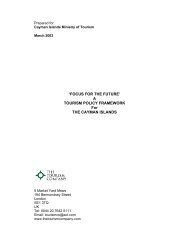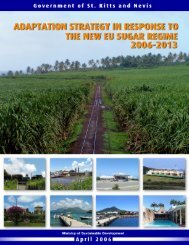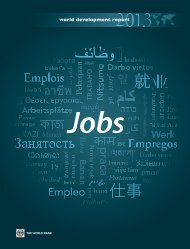Business Removing
Doing Business in 2005 -- Removing Obstacles to Growth
Doing Business in 2005 -- Removing Obstacles to Growth
- No tags were found...
You also want an ePaper? Increase the reach of your titles
YUMPU automatically turns print PDFs into web optimized ePapers that Google loves.
56 DOING BUSINESS IN 2005<br />
In 2003 only 3 companies delayed their disclosure. South<br />
Africa recently implemented similar regulation that enables<br />
the stock exchange to suspend trading in companies<br />
that neglect disclosure. Again, the number of delinquents<br />
has dropped.<br />
No matter how good the disclosure, the legal protections,<br />
and the enforcement channels that government<br />
provides, they will amount to nothing unless someone<br />
uses them. Enter the institutional investors. The California’s<br />
Public Employees’ Retirement System (CalPERS),<br />
with $162 billion in assets, is the most active. Every year<br />
CalPERS publishes its assessment of investor protections<br />
in emerging markets. This year its analysis shows that<br />
India, Israel, Korea and Poland have the strongest investor<br />
protections. Egypt, Jordan, Turkey and Venezuela<br />
have the weakest. Using such rankings, CalPERS only invests<br />
in countries with good protection. 25<br />
TIAA-CREF, the second largest pension fund in the<br />
United States, and Franklin Templeton, a large mutual<br />
fund, are also active in promoting disclosure and better<br />
corporate governance. Others should follow. These large<br />
players, because of their financial clout, influence not<br />
only individual companies but also regulators, putting<br />
them in the best position to lobby for change.<br />
Why reform?<br />
The more corporate governance scandals are reported,<br />
the better. It means expropriators are getting caught.<br />
And that small investors can take comfort in being protected<br />
by disclosure laws and shareholder rights.<br />
If the rights of investors are not protected, having<br />
majority ownership in a business is the only way to eliminate<br />
expropriation. A majority investor has access to all<br />
the company documents and prevails in business decisions.<br />
But few entrepreneurs would agree to have their<br />
business controlled by someone else. Those who do have<br />
less incentive to work hard, as the payoffs from success<br />
accumulate to someone else. The result: entrepreneurship<br />
is suppressed and fewer profitable investment projects<br />
are undertaken.<br />
A recent study of private equity transactions finds<br />
this exact pattern: Both the entrepreneur and investors<br />
lose out. In countries with higher risk of expropriation,<br />
the size of investments is half that in countries with good<br />
investor protections. Two deals take place for every 3<br />
deals in countries that protect investors. And in the risky<br />
countries investors acquire majority stakes, limiting their<br />
opportunity for diversification. 26<br />
This pattern also holds down the size of stock markets.<br />
When small investors see high expropriation risk,<br />
they do not invest. The market stays underdeveloped,<br />
with low trading volume (figure 7.7). 27 Instead, they may<br />
put their money in the banking sector, invest in real estate,<br />
or transfer it abroad. Either way, it does not reach<br />
profitable businesses in need of long-term financing.<br />
Better disclosure can change this. The United States securities<br />
legislation of 1933–34 increased financial disclosure<br />
and made auditors liable for mistakes—resulting in<br />
a significantly larger number of listings. 28 Today, if Russia<br />
were to adopt the more stringent disclosure regulations<br />
of Thailand, analysis suggests that its stock market<br />
capitalization would increase by up to 60%, and the volume<br />
of trades by 40%. 29<br />
FIGURE 7.7<br />
More disclosure, more access to equity markets and more turnover<br />
Perceived access to equity<br />
Turnover of stocks traded<br />
High<br />
High<br />
Low<br />
Low<br />
Least disclosure<br />
Most disclosure<br />
Countries ranked by disclosure index, quintiles<br />
Note: Analysis controls for income per capita. Relationships are significant at the 1% level.<br />
Source: Doing <strong>Business</strong> database, WEF (2004), World Bank (2004a).<br />
Least disclosure<br />
Most disclosure<br />
Countries ranked by disclosure index, quintiles

















